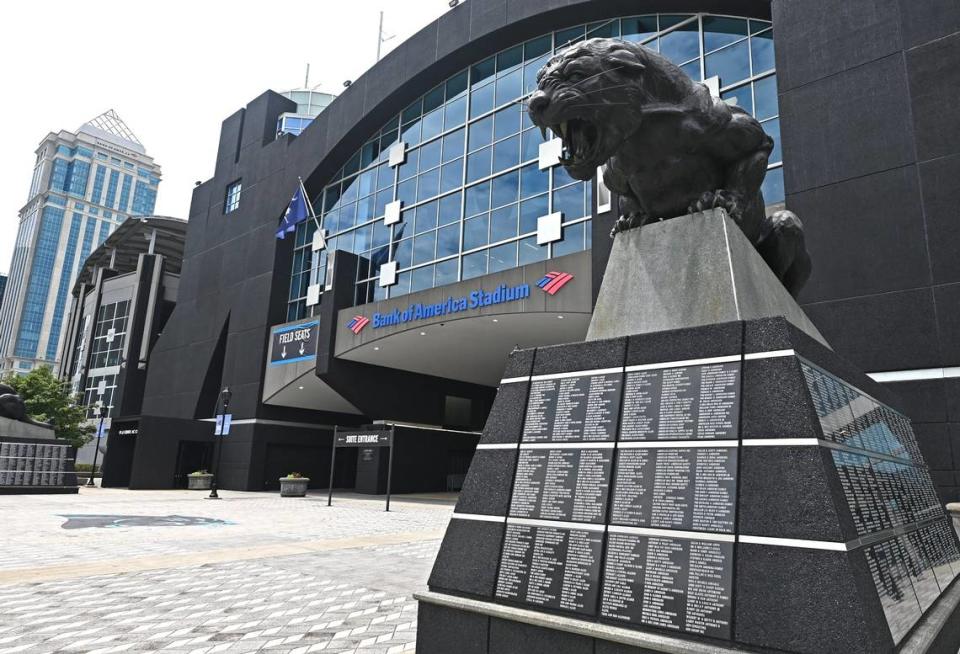Charlotte isn’t happy with Panthers stadium deal. The city should’ve seen it coming | Opinion
As it turns out, a whole lot of people in Charlotte aren’t too keen on the idea of giving $650 million to David Tepper and the Carolina Panthers for Bank of America Stadium renovations.
That’s not exactly a surprise. Giving an embattled billionaire owner more than half a billion dollars when his team hasn’t had a winning season in years was never going to excite a whole lot of people, even if it is a worthy and necessary investment.
But the city seems to be handling it entirely the wrong way.
As one would expect with a project of this magnitude, the city provided a forum for public input via an online survey. Of the 400 responses the city received, roughly 300 opposed the deal, WFAE reported. There were, of course, people who just didn’t think the city should be spending its money on a football stadium. But more interesting was the fact that many respondents didn’t seem to oppose the idea of subsidizing stadium renovations in general — they just don’t seem to want to subsidize David Tepper. Their responses ranged from “David Tepper should pay for his own stadium” to more nuanced concerns about Tepper’s track record with public-private partnerships.
“After the fiasco of the previously planned practice facility in Rock Hill, WHY, I repeat, WHY, would the City of Charlotte consider jumping into a deal with Tepper????” one commenter wrote, according to Axios Charlotte.
City staff didn’t mention that when summarizing the findings to Charlotte City Council this week, however. Charlotte’s economic development director Tracy Dodson simply told council members that people simply said “ “the money should be used for other items,” which is “expected,” or that they had “opinions on the design and proposed features.”
The concerns about whether Tepper will see this project to completion are legitimate ones, and they shouldn’t be brushed aside. What makes the city think he will keep his promises now, when he didn’t keep the promises he made on the Eastland redevelopment project? At-large council member Dimple Ajmera brought up Rock Hill and Eastland at the meeting, to which a consultant hired by the city responded that there is no need to worry. But what is the basis for that nonchalance, and how can the city better communicate it to concerned residents?
The most confounding part of it all is that this response was entirely predictable. People in Charlotte are frustrated with David Tepper and frustrated with the Panthers, and they’ve always been skeptical of any plan that involves significant public partnership with a billionaire. The concerns raised by the public are hardly new or surprising, and the city should have anticipated this kind of response.
Rattling off statistics about the stadium’s economic impact or Tepper’s philanthropic endeavors may resonate with council members as they mull the deal, but it’s not what the public wants or needs to hear. Frankly, most of them just want to hear that the on-field product will improve and Tepper won’t leave Charlotte hanging like he did Rock Hill.
Sure, at the end of the day, this isn’t a referendum — it’s a decision that will be made by representatives who we elect to do what they believe is in the best interests of our city. And this project may very well be in Charlotte’s best interests — the Panthers are valuable to our city, as is the stadium that they play in. But it would be unwise to plow forward with this project without first seeking to assuage the concerns of the taxpayers whose money will be used to fund it, or, at the very least, making sure they feel heard. Right now, it doesn’t feel like enough of that is happening, as city staff has urged council to officially approve the project by the end of the month.
To be fair, many council members do seem to understand this. They’re asking the right questions, and have rightfully pushed for a public hearing in advance of the vote. That hearing will be held Monday, which is a start. The challenge now, though, is to make the hearing feel like more than just a technicality. City leaders must not only listen to the public’s concerns, but actively take steps to address them, even if it means delaying the vote. Even if subsidizing stadium renovations is the right thing to do, doing so without good-faith attempts to earn the public’s blessing will only foster resentment and distrust.



